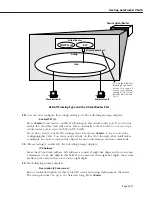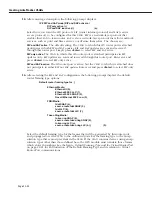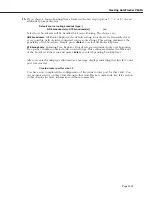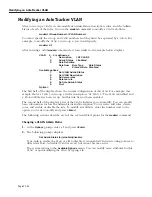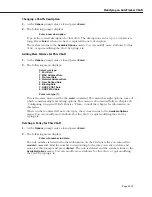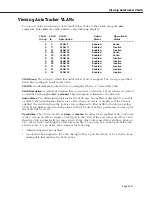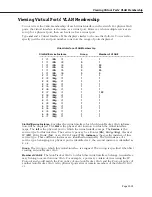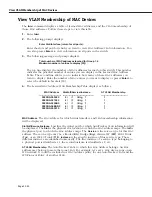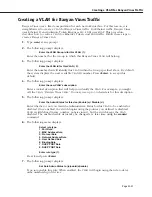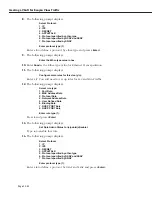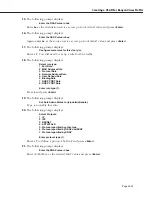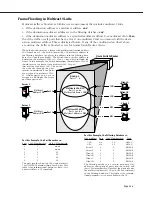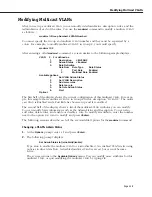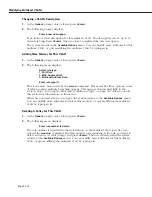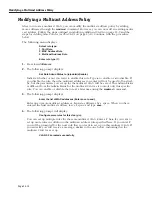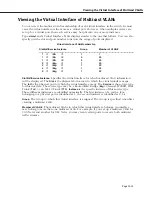
Page 23-1
23
Multicast VLANs
Multicast
VLANs
enable you to control the flooding of multicast traffic in your network. For
example, you can define a multicast
VLAN
for all users that want to receive
CNN
Newscasts or
any other video feed or combination of feeds.
You define the multicast traffic to be transmitted by specifying a multicast address. You define
the recipients of the multicast traffic by specifying ports and/or specific
MAC
addresses. The
members of a multicast
VLAN
consist of the ports specified to
receive
the multicast traffic and
the ports to which
MAC
address recipients are connected. Instructions for creating multicast
VLANs
begin on page 23-4.
Note the difference between multicast
VLAN
s and AutoTracker
VLAN
s. In AutoTracker
VLAN
s,
devices are assigned to
VLAN
s by examination of the frames that
originate
from those devices.
The members of an AutoTracker
VLAN
consist of source devices that fit the
VLAN
’s policies
and the ports to which those source devices are connected.
There are several differences between the configuration of multicast
VLAN
s and the configura-
tion of AutoTracker
VLAN
s. The following is a summary of points to note when configuring
multicast
VLAN
s:
• You can not configure routing for multicast
VLAN
s. Multicast
VLAN
s are independent broad-
cast domains for multicast traffic originating from a multicast address and transmitted to
one or more recipients.
• Multicast
VLAN
s allow three rules: Port,
MAC
Address, and multicast policy.
• There is not a default multicast
VLAN
. Therefore, you can define rules for all 32 available
multicast
VLAN
s. All ports (even those that eventually become part of a multicast
VLAN
)
start off in the standard AutoTracker default
VLAN
#1, but they only get assigned to a multi-
cast
VLAN
if you explicitly assign them to one.
• All multicast
VLAN
s include the multicast policy. This policy specifies the multicast address.
You use the other two rules—Port and
MAC
Address—to define the destination of the
multicast traffic.
Summary of Contents for Omni Switch/Router
Page 1: ...Part No 060166 10 Rev C March 2005 Omni Switch Router User Manual Release 4 5 www alcatel com ...
Page 4: ...page iv ...
Page 110: ...WAN Modules Page 3 40 ...
Page 156: ...UI Table Filtering Using Search and Filter Commands Page 4 46 ...
Page 164: ...Using ZMODEM Page 5 8 ...
Page 186: ...Displaying and Setting the Swap State Page 6 22 ...
Page 202: ...Creating a New File System Page 7 16 ...
Page 270: ...Displaying Secure Access Entries in the MPM Log Page 10 14 ...
Page 430: ...OmniChannel Page 15 16 ...
Page 496: ...Configuring Source Route to Transparent Bridging Page 17 48 ...
Page 542: ...Dissimilar LAN Switching Capabilities Page 18 46 ...
Page 646: ...Application Example DHCP Policies Page 20 30 ...
Page 660: ...GMAP Page 21 14 ...
Page 710: ...Viewing the Virtual Interface of Multicast VLANs Page 23 16 ...
Page 722: ...Application Example 5 Page 24 12 ...
Page 788: ...Viewing UDP Relay Statistics Page 26 24 ...
Page 872: ...The WAN Port Software Menu Page 28 46 ...
Page 960: ...Deleting a PPP Entity Page 30 22 ...
Page 978: ...Displaying Link Status Page 31 18 ...
Page 988: ...Displaying ISDN Configuration Entry Status Page 32 10 ...
Page 1024: ...Backup Services Commands Page 34 14 ...
Page 1062: ...Diagnostic Test Cable Schematics Page 36 24 ...
Page 1072: ...Configuring a Switch with an MPX Page A 10 ...
Page 1086: ...Page B 14 ...
Page 1100: ...Page I 14 Index ...

